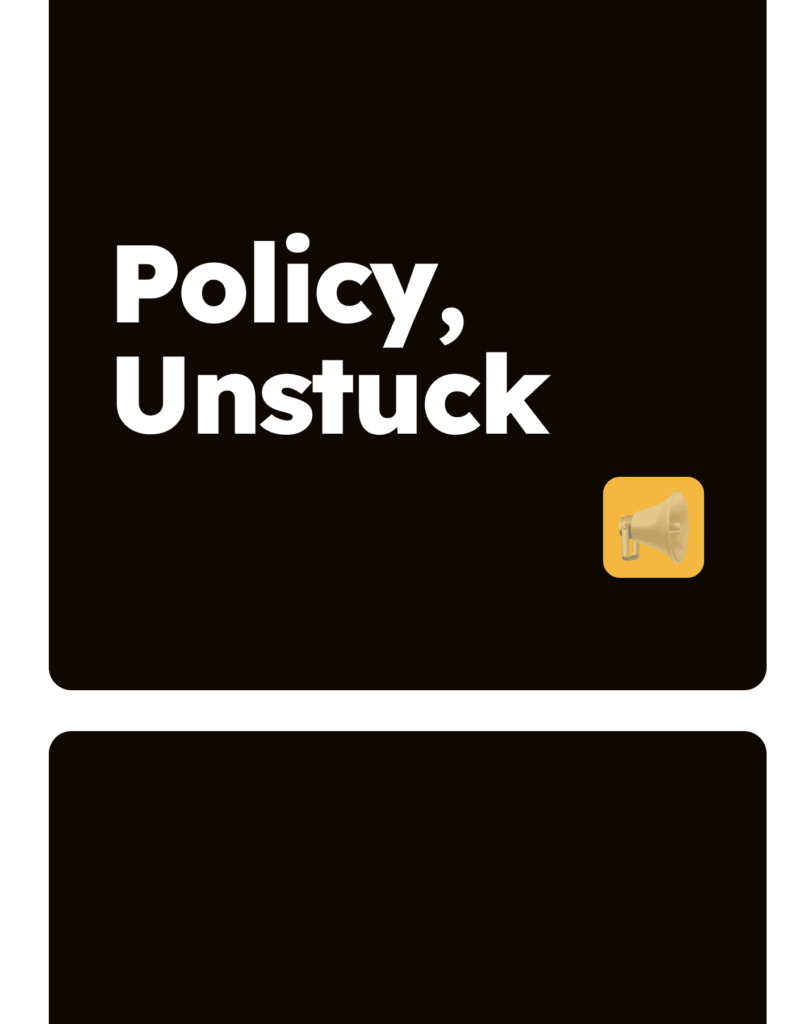This interview with James Nation is part of the GETTING POLICY UNSTUCK series. James is the former Deputy Director of the Number 10 Policy Unit, and former Special Advisor to the Chancellor.
A view from the Number 10 Policy Unit – James Nation
When there’s a big report that says ‘this sector has the potential to add gazillions of GDP to the economy’, fair play, you’ve hired an economics consultancy. But why should I care? Is there a regional jobs benefit? Does it play to one of the missions if I’m a Labour advisor? The big number itself doesn’t get me interested. The value in a big externality number is the media hook, but what gets an advisor interested is the methodology and how it fits into the way in which the Government will be assessing a problem. When you see these reports, you go straight to the methodology. What you’re looking for is an acknowledgment of the ways in which it can be done in the best possible way by outside analysts. So for instance, if you’re doing analysis on tax you would have seriously engaged with Treasury ready reckoner numbers or what the Office for Budget Responsibility are putting out in their forecasts. Then a Treasury advisor will listen to you because you’re trying to empathise with how they are confronting a problem with officials.
You’ve got to try and make your ideas relevant to Labour’s missions, which are deliberately open-ended. The other route is more ‘what will happen if they don’t confront a particular problem?’ So much of the business of Government is reactive. Things come at you on a daily basis, and there are certain things that Labour are just going to need to address. You need to be clear on why they should bother fixing this now and not put it in the ‘too difficult’ pile. Is it actually going to cause the country serious problems or impinge on the proactive missions agenda?
In Number 10, everything that is coming to you is a serious trade-off or an issue that has been forced by external events or the media. Do I think I smashed it in terms of engagement with externals? No way. There was always something else going on. It’s hard to understate just how time poor you are; I should have carved out more space for proper engagement.
The best kind of external engagement was when there was empathy for the situation that we were faced with. It worked best when it wasn’t a case of ‘here’s a slide deck about what our business does’ but ‘knowing you want to do this, here’s a particular bit of expertise we can offer’. If you’re thinking about how you can contribute as opposed to ‘we just want to have a conversation with someone in Government’ then you’re on the right track.
It’s about finding your moment to intervene in policy, as opposed to these ongoing ‘grand commissions’ which are harder to translate. Often those more grandiose think tank reports which say we need to fundamentally recast how we think about the labour market… That’s great, but can often be too abstract. I’m looking for specific ideas to implement. What exactly do you mean? What do you want me to do? Whereas if a think tank says ‘we’ve got a neat intervention and we’re confident based on the noises that we’re hearing that the intervention could well get implemented in full even though it’s a small intervention or a tiny fund’, that was often much more helpful and viable. Small is beautiful here.
The minute you try to impugn people’s motives in a campaign and go aggressive, that closes the door. Seriously think about the motives of the people you disagree with… Are they really that bad? And if not, try to engage them and bring the facts to the table about whatever it is, and there would be an interesting conversation. Also, challenge yourself to confront and be honest about what the public think about your issue before you go aggressive. The aggressive approach, not recognising the Government’s constraints, doesn’t help. But, generally, I think we tend to get the tone right in the United Kingdom and I hope we continue to do so.
The Prime Minister needs fixers around him. Good luck to Labour and the mission-based approach of having senior ministers with prime ministerial backing like Pat McFadden – that may well work to drive stuff through the system. But you definitely need to have fixers around the Prime Minister. There’s the structural thing of he’s got five minutes on energy policy. He needs to have his energy person from the policy unit in the room to tell him what he needs to know. These roles are critical and it is why we brought them back.
Getting policy unstuck depends on the issue. If it’s something with a quick fix, then it can be something that the PM says at PMQs or where he wants a particular situation or a small pot of money or regulation change, provided that’s not too hard legislatively. In those cases action can happen quite quickly. But for the more systemic issues where you have to fundamentally change a culture in a department or maintain pressure from the centre, then that resolute focus and accountability on that department, of course, is harder.
It comes down to a variety of factors around the intangible nature of power and effective power. What is the Prime Minister’s position? What kind of majority do you have in Parliament? If it’s something legislative and then with the Department, it’s making them believe that this is something that you are going to be consistently held to account on. But also, have you got that link between the people at the top and the delivery side? There are so many gaps in between, and authority and detail get lost as it moves through the system. If you can get direct contact between people who are known to have the Prime Minister’s ear – or even the PM himself – and delivery people, that really helps make things happen but, given time pressures, choose your moments and the issue.
If you’re thinking about Special Advisor roles in the new Government, you’re probably a thoughtful person in your particular area and you’ve got a lot to contribute. You’ve been in opposition or you’ve been in think tanks thinking about all of this for quite some time. So trust your instincts and remember that you are there as that person to challenge and to try and engage with the outside world as much as you can, even while you’re also directing or helping to direct the Civil Service machine. Try and hold on to that – it’s difficult. It’s an enormous privilege to work in these roles, you’ve got that chance to shape things. Enjoy it.





